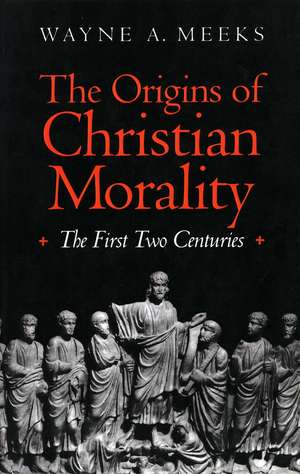The Origins of Christian Morality: The First Two Centuries
Autor Wayne A. Meeksen Limba Engleză Paperback – 27 sep 1995
By the time Christianity became a political and cultural force in the Roman Empire, it had come to embody a new moral vision. This wise and eloquent book describes the formative years—from the crucifixion of Jesus to the end of the second century of the common era—when Christian beliefs and practices shaped their unique moral order.
Wayne A. Meeks examines the surviving documents from Christianity's beginnings (some of which became the New Testament) and shows that they are largely concerned with the way converts to the movement should behave. Meeks finds that for these Christians, the formation of morals means the formation of community; the documents are addressed not to individuals but to groups, and they have among their primary aims the maintenance and growth of these groups. Meeks paints a picture of the process of socialization that produced the early forms of Christian morality, discussing many factors that made the Christians feel that they were a single and "chosen" people. He describes, for example, the impact of conversion; the rapid spread of Christian household cult-associations in the cities of the Roman Empire; the language of Christian moral discourse as revealed in letters, testaments, and "moral stories"; the rituals, meetings, and institutionalization of charity; the Christians' feelings about celibacy, sex, and gender roles; and their sense of the end-time and final judgment. In each of these areas Meeks seeks to determine what is distinctive about the Christian viewpoint and what is similar to the moral components of Greco-Roman or Jewish thought.
Wayne A. Meeks examines the surviving documents from Christianity's beginnings (some of which became the New Testament) and shows that they are largely concerned with the way converts to the movement should behave. Meeks finds that for these Christians, the formation of morals means the formation of community; the documents are addressed not to individuals but to groups, and they have among their primary aims the maintenance and growth of these groups. Meeks paints a picture of the process of socialization that produced the early forms of Christian morality, discussing many factors that made the Christians feel that they were a single and "chosen" people. He describes, for example, the impact of conversion; the rapid spread of Christian household cult-associations in the cities of the Roman Empire; the language of Christian moral discourse as revealed in letters, testaments, and "moral stories"; the rituals, meetings, and institutionalization of charity; the Christians' feelings about celibacy, sex, and gender roles; and their sense of the end-time and final judgment. In each of these areas Meeks seeks to determine what is distinctive about the Christian viewpoint and what is similar to the moral components of Greco-Roman or Jewish thought.
Preț: 298.47 lei
Nou
Puncte Express: 448
Preț estimativ în valută:
57.13€ • 62.08$ • 48.02£
57.13€ • 62.08$ • 48.02£
Carte tipărită la comandă
Livrare economică 21 aprilie-05 mai
Preluare comenzi: 021 569.72.76
Specificații
ISBN-13: 9780300065138
ISBN-10: 0300065132
Pagini: 285
Dimensiuni: 156 x 235 x 18 mm
Greutate: 0.41 kg
Ediția:Revised
Editura: Yale University Press
Colecția Yale University Press
ISBN-10: 0300065132
Pagini: 285
Dimensiuni: 156 x 235 x 18 mm
Greutate: 0.41 kg
Ediția:Revised
Editura: Yale University Press
Colecția Yale University Press
